Super vs Notion AI | An honest review after real-life testing
I tested Notion AI and Super to find out which one's better for enterprise search and automating knowledge workflows.
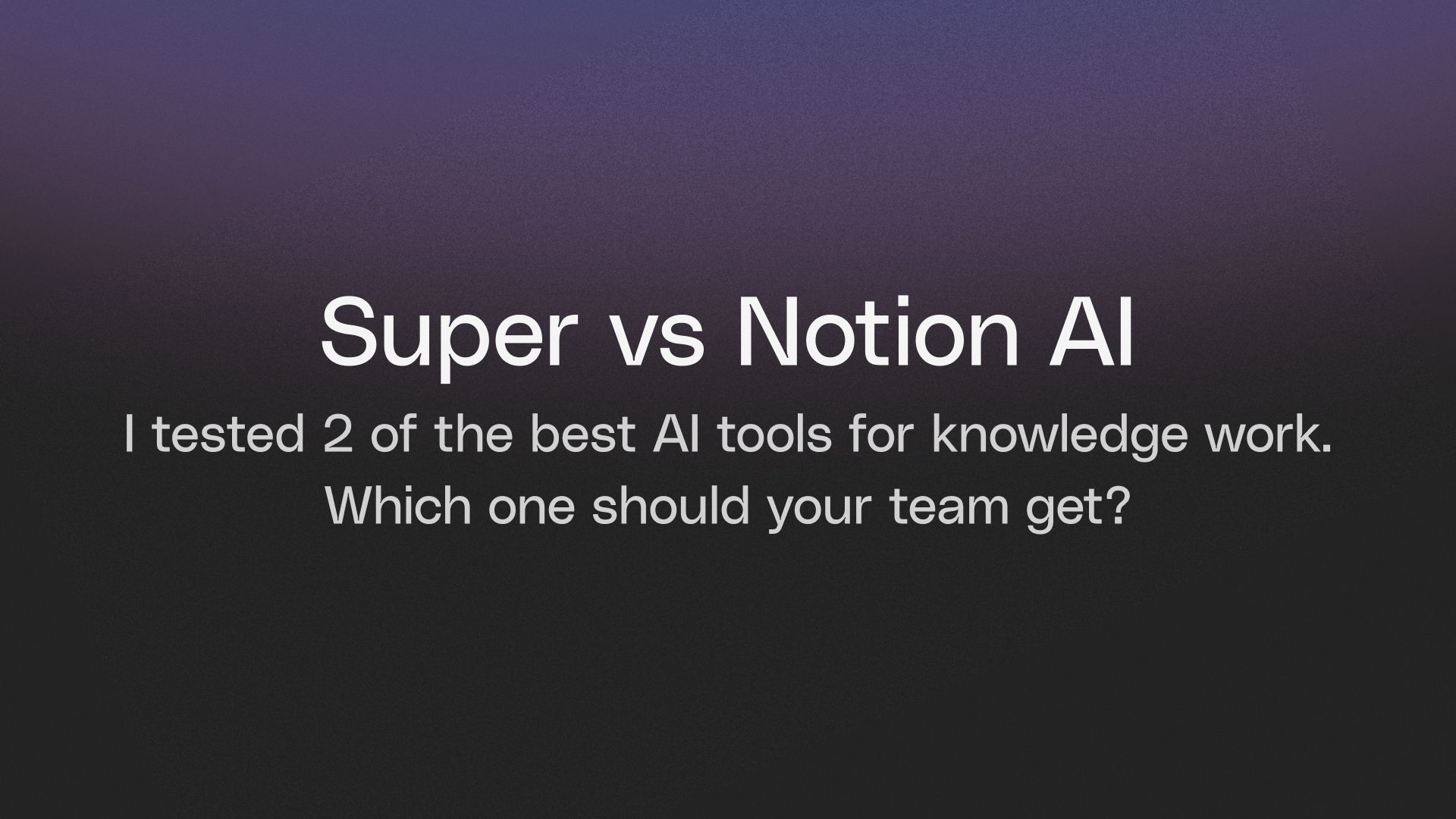
Super is the world's most accurate enterprise search tool. Its goal is to help you find information from your scattered company data in the fastest and simplest way possible, wherever your need it.
Notion AI is the AI layer built on top of Notion's all-in-one workspace. It offers enterprise search with external tools and some agentic capabilities like document generation within the workspace.
Since enterprise search is a newly growing category post AI, Notion AI is often compared to Super by our prospects for search use cases.
So, I decided to document all the differences in capability, speed, accuracy, and more for both tools.
I tested both by connecting them to our Slack and Google Drive, asking 15 questions each, and tracking answer quality, speed, and formatting.
Moreover, I cover their data sources, setup experience, side-by-side testing results, unique features, and which tool actually delivers better search accuracy for daily use.
A TLDR
| Feature | Super | Notion AI |
|---|---|---|
| What it is | Dedicated knowledge layer across all company tools | AI layer built into Notion's workspace |
| Data Sources | 16 integrations | 11 integrations |
| Entry Points | Web app, Slack (@super), browser extension, contextual buttons, API (Zapier/n8n) | Notion app only |
| Search Accuracy | Winner. Deeper search across more documents and sources | Shallow search, faster but less comprehensive |
| Response Time | 43.9s average | Winner. 23.9s average |
| Formatting | Functional, less polished | Winner. Clean, well-structured, easy to scan |
| Citations | Winner. Inline citations with hover explanations, one-click source exclusion | Basic citations, requires redirect to verify |
| Assistants/Agents | AI-assisted generation, can be tied to Slack channels for automatic help | Agentic capabilities, can auto-run tasks, generate documents and databases |
| Unique Features | Digests (automated reports), Bulk Mode (batch 100s of questions), Contextual Buttons | Deep research mode, document generation, meeting transcriptions |
| Pricing | $15-20/month per user | $20-24/month per user (requires Business plan) |
| Free Trial | 3 weeks (after talking to sales) | 4 weeks |
| Best For | Teams wanting enterprise search across existing tools without switching platforms | Teams already using Notion as their primary workspace |
What these tools are
Notion AI
Notion AI is the AI layer built into Notion's all-in-one workspace platform. It sits on top of Notion's existing features and adds AI capabilities throughout the interface.
You can use it to
- Generate content
- Summarize pages
- Ask questions about data across your apps i.e. Enterprise Search
It's designed for teams that have already chosen Notion as their primary workspace and want to add AI capabilities to enhance their existing workflows. They've done a great job of making the AI features feel native because you're not leaving the platform or learning a new interface.
Super
Super is a dedicated knowledge layer designed to work across all your company's tools and workflows. Think of it as company memory that connects to your existing stack and lets you ask everyday questions "What's our time off policy?" to complex-work-related questions "How have our customers been responding to the new feature in the last 9 months?"
It's goal is simple - to bring your company knowledge to your work apps and workflows.
What makes Super different is that it's tool-agnostic and built for automation.
You can use it in the app, in Slack with @super, as a browser extension, through contextual buttons embedded in your apps, or even as an API in tools like n8n and Zapier to build custom workflows.
Unlike Notion, Super doesn't replace your existing tools or force you onto a new platform. Instead, it creates a knowledge layer that stops time-waste from tab-hopping for information you know is buried somewhere.
Testing
I tested both of them for the particular use case of enterprise search. I did this by connecting both of them to Slack and Google Drive and asking them the same 15 questions.
Judgement criteria and grading system
2 factors determine the quality of an enterprise search tool
- Answer accuracy - The core function is helping you find information accurately. If they hallucinate facts, they're more destructive than helpful in terms of business impact.
- Response time - If one tool takes 30 seconds vs. 30 mins, which would you actually use daily? Fast tools get adopted. Slow tools get abandoned because it's faster to search yourself.
And from it, I did a 4-point rating system, 4 being the highest and 1 being the lowest
- 4 - Fully accurate: Answer's correct, comprehensive, cited, well-formatted
- 3 - Accurate with minor blindspots: The answer is accurate while omitting a few things (1 value prop out of 5, etc.)
- 2 - Partly Correct: The answer has some correct fragments mixed with some incorrect/outdated information
- 1 - Incorrect: The answer is false or contradicts sources.
Types of questions
- Simple queries - Finding specific pieces of information verbatim from your knowledge sources
- Medium broad knowledge - Understanding company context and semantically connecting different information sources
- Complex step-by-step queries - Planning research, collecting data points, synthesizing them, and deriving an answer
- Meta queries - Understanding metadata (like "Who's the most active person in our team Slack?")
- Data queries - Testing retrieval accuracy of hard facts for reporting or analysis
This is how my testing sheet looked in the end:
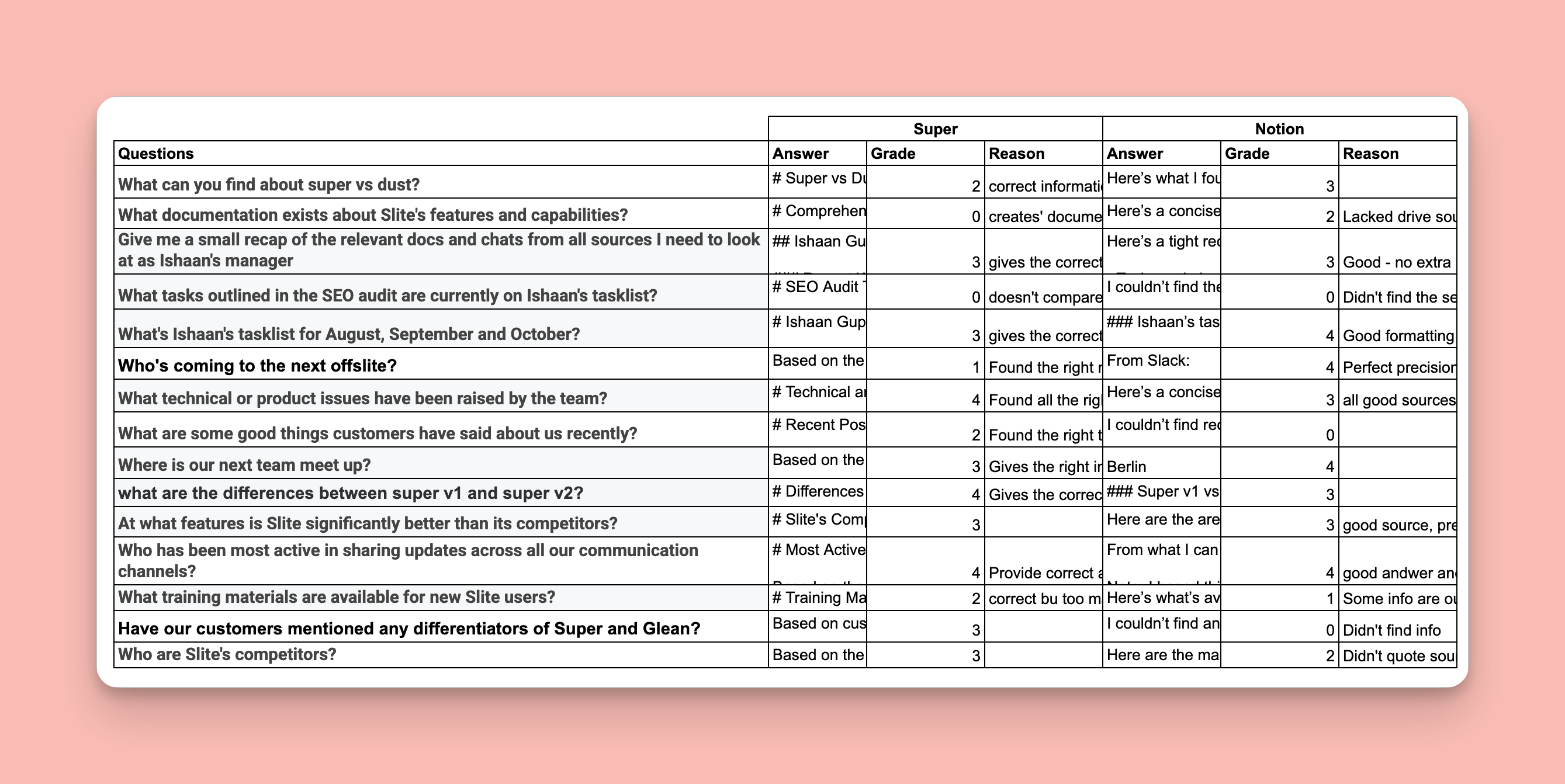
Test results
Here's where things get interesting. Super averaged 43.9 seconds per response. Notion AI averaged 23.9 seconds. But speed tells only half the story.
Why Notion AI is faster: It does shallow search and doesn't hit nearly as many documents or knowledge sources as Super does. This explains the speed difference.
Why Super takes longer: It searches deeper and across more sources, which takes longer but finds more accurate, comprehensive answers.
Quality: Notion AI's main strength is better formatting. But Super consistently delivers better overall quality because of its deeper search capabilities.
Here are all 15 questions with response times and quality scores:
Q1: What can you find about super vs dust?
- Super (39s, 2/4): Found correct info but buried in irrelevant fluff
- Notion AI (19s, 3/4): Clean answer with good formatting
Q2: What documentation exists about Slite's features?
- Super (43s, 0/4): Created documentation instead of finding it
- Notion AI (19s, 2/4): Lacked Drive sources
Q3: Give me a recap of relevant docs and chats as Ishaan's manager
- Super (41s, 3/4): Correct information, no issues
- Notion AI (26s, 3/4): Good answer without extra meta nuance
Q4: What tasks from the SEO audit are on Ishaan's tasklist?
- Super (58s, 0/4): Didn't compare the two sources needed
- Notion AI (24s, 0/4): Didn't find the SEO audit to compare
Q5: What's Ishaan's tasklist for August, September and October?
- Super (61s, 3/4): Correct info, refers to both sources
- Notion AI (28s, 4/4): Good formatting as list with relevant source for each month
Q6: Who's coming to the next offslite?
- Super (20s, 1/4): Found right thread but couldn't find 'yes' RSVPs
- Notion AI (30s, 4/4): Perfect precision and answer
Q7: What technical or product issues have been raised?
- Super (65s, 4/4): Found all info from Github and Slack with proper depth
- Notion AI (11s, 3/4): Good sources from Github, Slack, and Drive
Q8: What are some good things customers have said recently?
- Super (47s, 2/4): Found right thread but went in tangents, created fluff
- Notion AI (53s, 0/4): Didn't find info
Q9: Where is our next team meet up?
- Super (33s, 3/4): Right info with some fluff
- Notion AI (8s, 4/4): Clean, direct answer
Q10: What are the differences between super v1 and super v2?
- Super (56s, 4/4): Correct answer, in-depth and well cited
- Notion AI (32s, 3/4): Good answer
Q11: At what features is Slite significantly better than competitors?
- Super (54s, 3/4): Comprehensive correct answer
- Notion AI (10s, 3/4): Good source, precise, accurate
Q12: Who has been most active sharing updates across channels?
- Super (53s, 4/4): Correct answer with platform-specific details
- Notion AI (31s, 4/4): Good answer, balanced with caveat, didn't consider Github
Q13: What training materials are available for new Slite users?
- Super (27s, 2/4): Correct but too detailed, hard to find links
- Notion AI (15s, 1/4): Some info out of topic
Q14: Have customers mentioned differentiators of Super and Glean?
- Super (39s, 3/4): Correct answer
- Notion AI (36s, 0/4): Didn't find info
Q15: Who are Slite's competitors?
- Super (23s, 3/4): Good answer
- Notion AI (16s, 2/4): Didn't quote source
Test conclusion
Accuracy - Super wins
Both tools find answers, but Super's deeper search across more documents consistently delivers more complete, reliable information. When you ask a question, Super hits significantly more knowledge sources and digs deeper into each one. Notion AI's shallow search is faster but frequently misses critical context that could change your understanding of a situation. For enterprise search where accuracy matters, Super's thoroughness is what you need.
This finding mirrors the experience of one of our customers, Wuffes, as Hasan Ijaz compared Super's search with Notion's. He shared that Notion's search is limited and works if you put in specific keywords while Super just understands the questions in one go.
"I don't know what magic the team has done, but with Super, when it comes to searching for stuff, it just fetches the right information even without the exact word or context."
Read the full case study here.
Response time - Notion AI wins
Notion AI wins on speed (23.9s avg vs Super's 43.9s avg). But this speed comes at a cost. Notion AI doesn't hit nearly as many documents or knowledge sources as Super does, which explains why it's faster but less accurate. Super takes longer because it's actually searching deeper and across more sources.
The question is: would you rather have a incorrect answer fast, or wait a few seconds for an answer that's comprehensive and reliable?
Formatting - Notion AI wins
Notion AI has better structured responses with cleaner presentation. Answers are well-formatted, easy to scan, and visually organized. Super's answers are more functional than beautiful. If presentation matters a lot to you, Notion AI delivers a better visual experience.
Citations - Super wins
Super had much better inline citations. For every substantial point, Super cited it and upon hovering, briefly explains why the source was cited the way it was. Notion AI cited its sources but you'd have to redirect to the source to see where it got its information from.
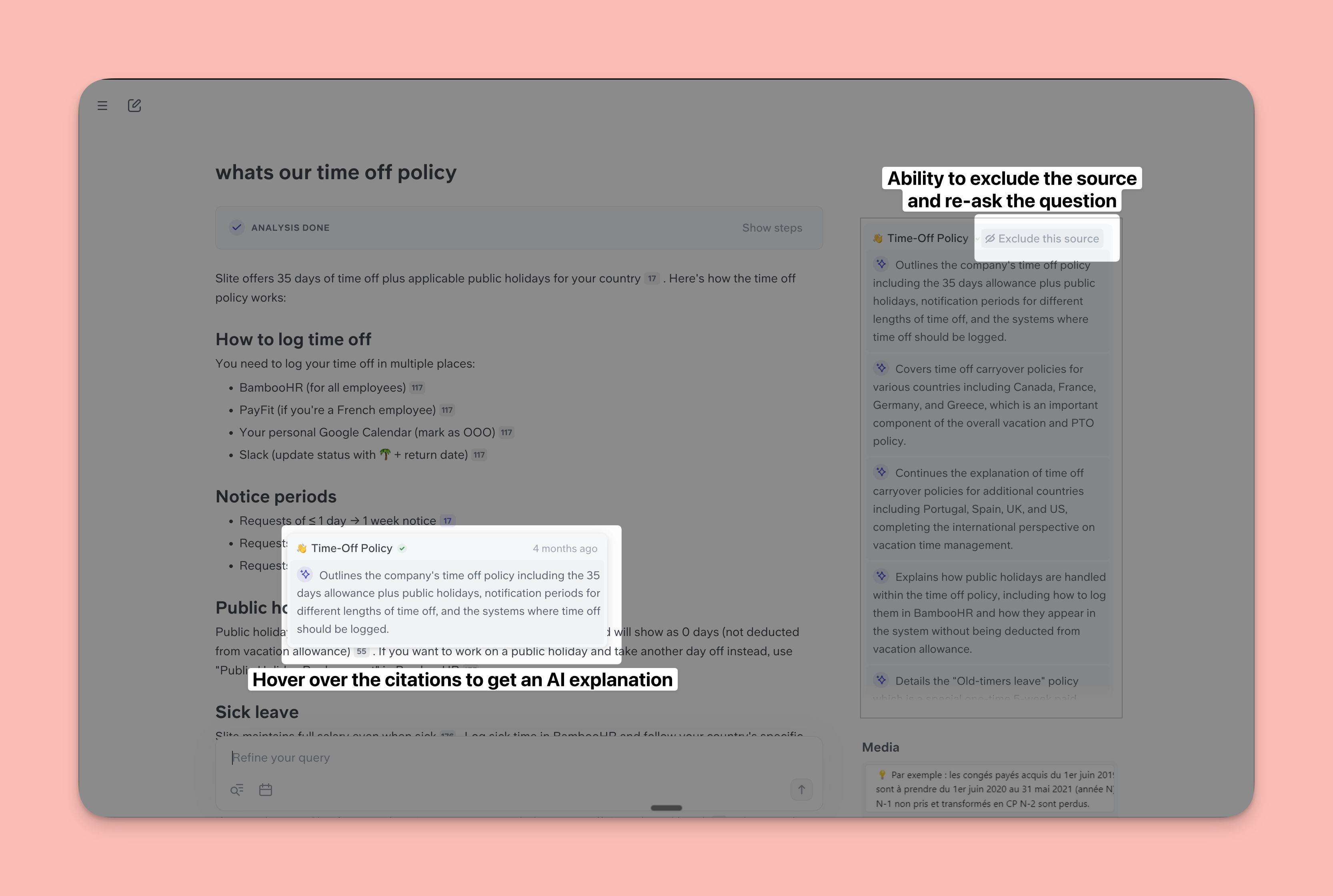
Moreover, in Super, if an outdated source gets cited, you have to option to exclude it in a single-click and re-ask the question. No similar specific source exclusion exists for Notion AI.
What matters more
Quality and accuracy win over speed. Fast but incomplete answers don't help when you need reliable information for critical work. Super takes longer because it searches deeper, and that thoroughness is exactly what enterprise search should deliver. You're not just looking for any answer, you're looking for the right answer with all the context you need to make informed decisions.
Overall, Super's responses are more accurate where Notion AI can look speedy but give inaccurate and unreliable responses.
Data sources
Super connects to 16 data sources with deep integrations, going as far to index all your meta data from the following tools: Google Drive, Linear, Slack, SharePoint, Jira, Confluence, Notion, GitHub, Git, Public Help Center, Files, Custom, Hubspot, Attio, Asana, and Intercom.
Notion AI connects to 11 data sources: GitHub, Google Drive, Slack, Notion, Gmail, Jira, Linear, Microsoft Teams, Outlook, SharePoint, and Mail.
Notion AI supports MCP connections for additional integrations. Super's MCP support is coming soon.
To sum up,
Super offers more data sources (16 vs 11) with the same deep integration quality. If your tools are covered by Super, you get broader coverage with accurate search across all of them.
Entry Points
Entry points are all about how and where you can use Super and Notion AI.
Notion AI only works within their app. You cannot use it in Slack or as a browser extension.
Super works everywhere: web app, directly in Slack (just type "@super"), browser extension, and contextual buttons on any webpage.
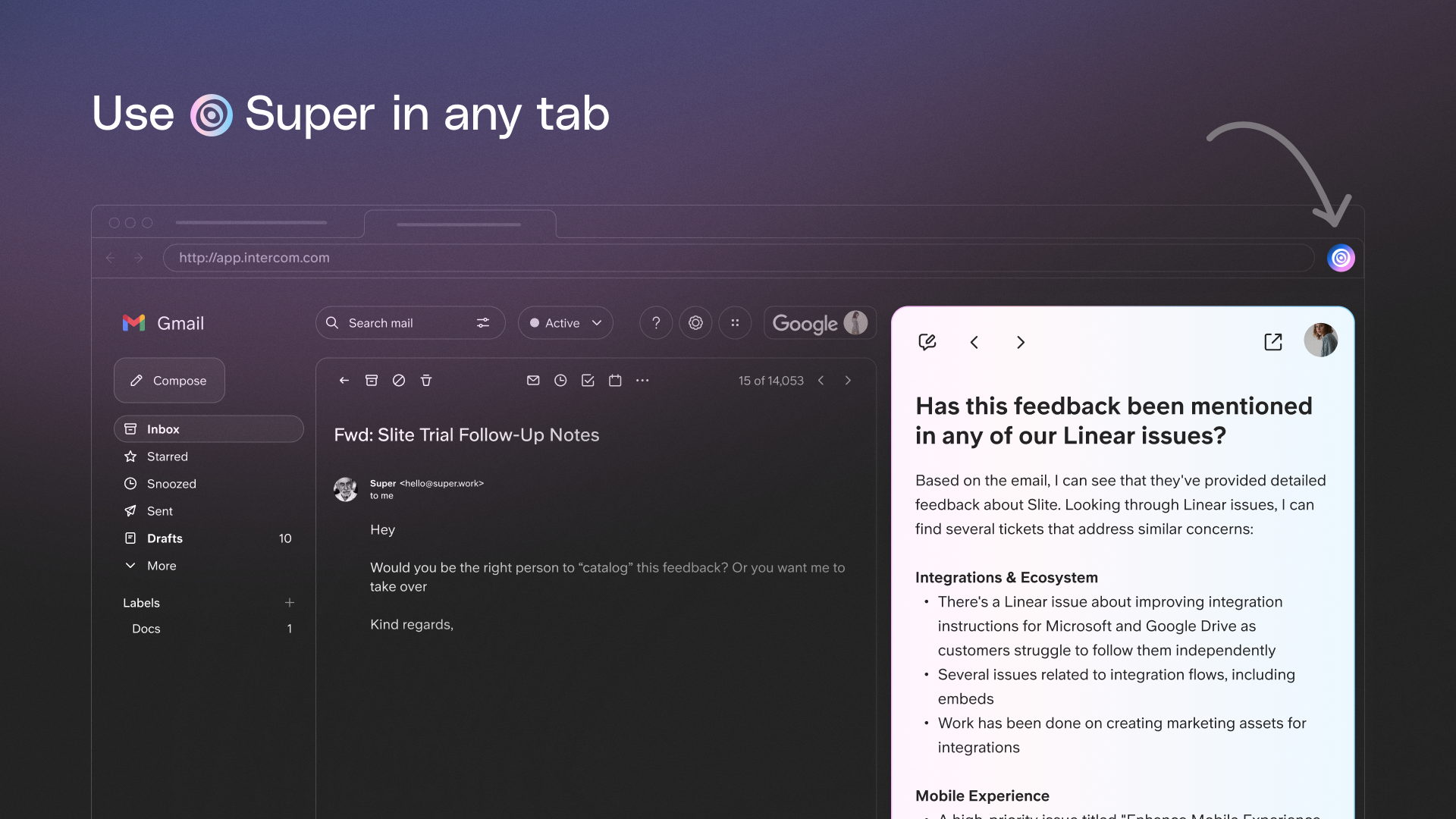
For example, you can configure an Intercom button that grabs conversation context, gathers correct information from your help center and recent bug fixes, generates a response in your tone, and pastes it where you need it.
Beyond normal usage, you can get Super's trusted answers in Zapier/n8n workflows or in custom apps using the Super API.
Therefore,
Super wins on accessibility. You can use it where you actually work (Slack, browser, embedded in apps), while Notion AI requires you to be in the Notion app.
Assistants & Agents
Claude Projects and ChatGPT's custom GPTs are a way to set internal knowledge along with a set of instructions to fulfill a specific use case. It helps you avoid copy-pasting the same instruction and context each time for routine tasks. For eg: a writer like me will build a Claude project for writing case studies with specific internal knowledge on our product description, case study structure, tone of voice guidelines, etc.
Both Notion AI and Super let you do the same by using Agents/Assistants where you can
- Pick specific data sources
- Give specific instructions on the task + response format.
Unlike projects or custom GPTs - where you have to manually update internal knowledge - Notion AI's Agents or Super's Assistants are constantly synced to dynamic data sources to fulfill many more use cases. For example, you can ask either of them, "What are the last 5 deals that came in the pipeline?" and they'll answer them with the latest deals each time because they're connected to your CRM and synced with real-time data.
While that's their core functionality, they do have their differences.
Notion agents' differentiators
Notion agents are agentic and can conduct tasks on your behalf without you having to ask.
For instance, you can create a Notion agent to update your task list document, and it will auto-run at a specific time each day. You can also use agents to generate documents directly or generate databases right within the workspace.
The agentic capabilities mean they can take autonomous actions within Notion's ecosystem based on triggers or schedules you set.
Super assistants' differentiators:
Super assistants offer AI-assisted generation and can be tied to specific Slack channels to automatically provide help when needed.
For example, you can create a customer support assistant within Super and tie it to your customer support Slack channel. Every time your rep has a question they don't know the answer to, the Super customer success assistant can automatically jump in with the latest info from your pre-defined data sources in an answer format that your customer service rep can use.
This makes knowledge accessible right where your team is already working, without them having to context-switch or manually search.
In a sentence,
Notion AI focuses on content creation features (documents, transcripts, research). Super focuses on knowledge automation features (digests, bulk processing, contextual actions). Different strengths for different needs.
Unique features
Both tools share the capabilities of enterprise search and custom Agents. Beyond that, both of them have different AI capabilities packaged under them. Let's go through them.
Notion AI
Beyond enterprise search and agents, Notion AI has
- Deep research mode - Notion Agents can access the web and do deep research like Perplexity, Gemini, ChatGPT, or Claude
- Document generation - Notion Agents can also directly create documents, databases, etc. from your chat conversations and move them in your workspace.
- Meeting transcriptions - Notion automatically transcribes meetings into notes and action items. It doesn't join the meeting and uses your device to record audio and based on Reddit reviews, works really well.
Super
Super has 3 unique features that help you get the most out of your company knowledge, they are:
- Digests - Automate recurring reports sent on email respecting data sources and preset format
- Bulk Mode - Ask 100s of questions for RFPs or security questionnaires in one go
- Contextual Button - Inject a button in the UI of other apps like Intercom and generate content based on preset assistants.
Digests
Super Digests are automated AI-powered reports that pull from multiple sources and deliver regular updates without manual effort.
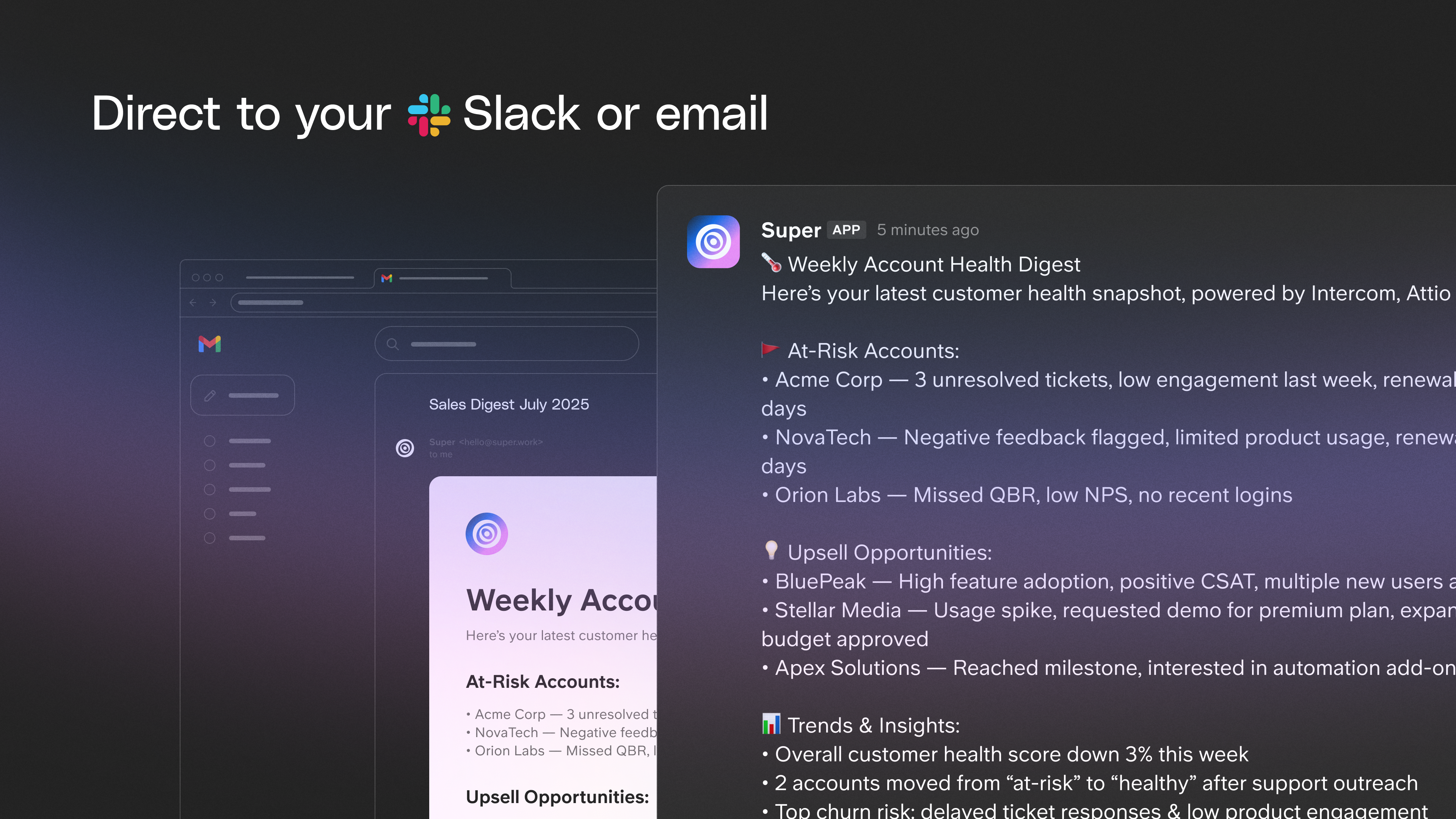
You set your data sources and format, then get reports periodically via Slack or email.
It's automated several reports in our team. Previously, our AE manually summarized her weekly deals every Monday. Now Super does it automatically and sends it to leadership before we start our week. Digests differ from Assistants because they're automated reports, while Assistants need specific questions.
Bulk Mode
Bulk Mode lets you paste 10-1000 questions and get answers in one batch instead of processing them one by one.
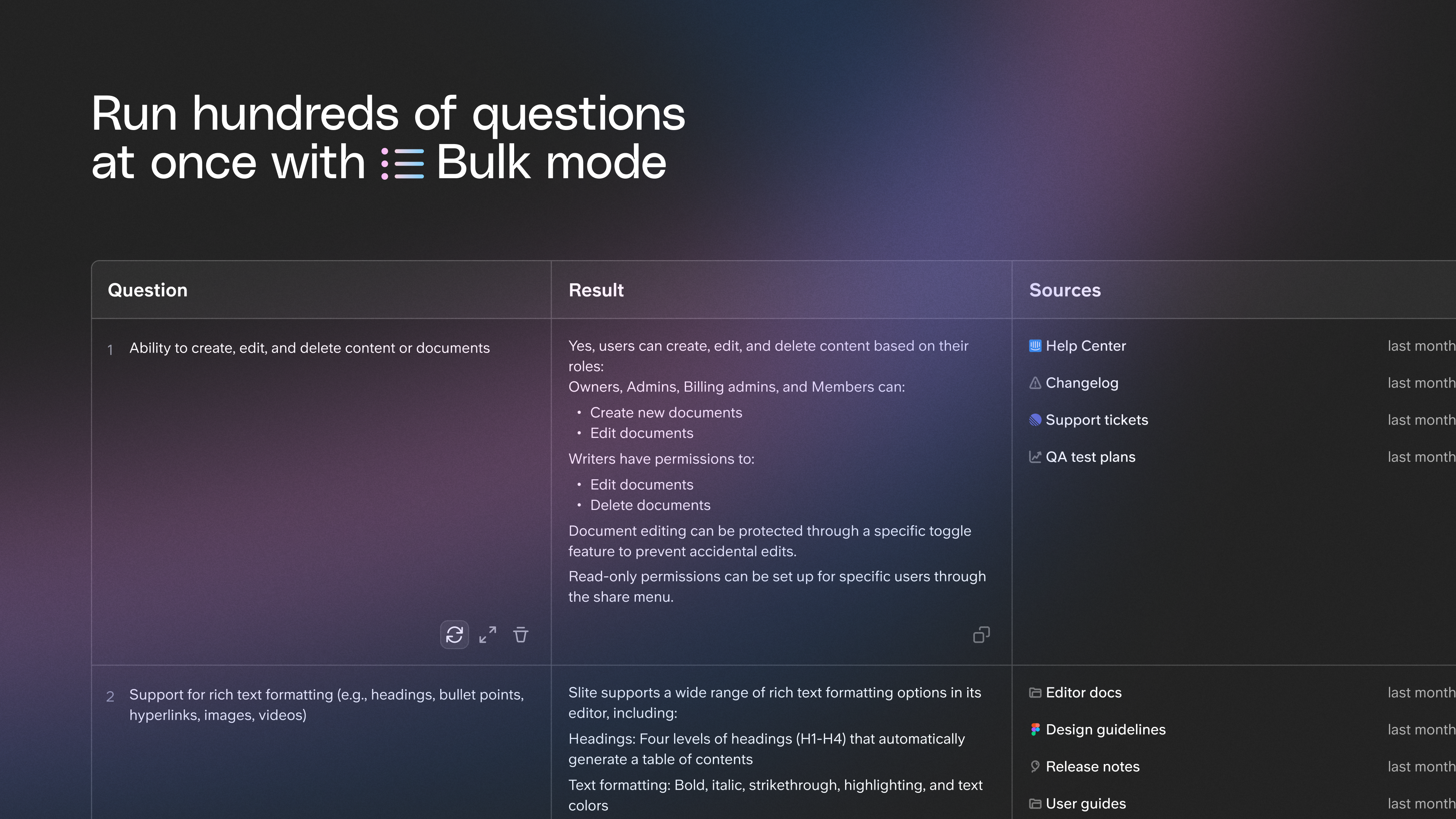
I tested it with 10 questions that would've taken hours to answer manually by digging through docs and following up with the product team. It can actually handle hundreds though, making it a legit game changer for RFPs or security questionnaires where you have 100s of questions on a deadline.
Contextual Button
Contextual buttons are AI-powered interface elements embedded in web apps that provide help without switching platforms.
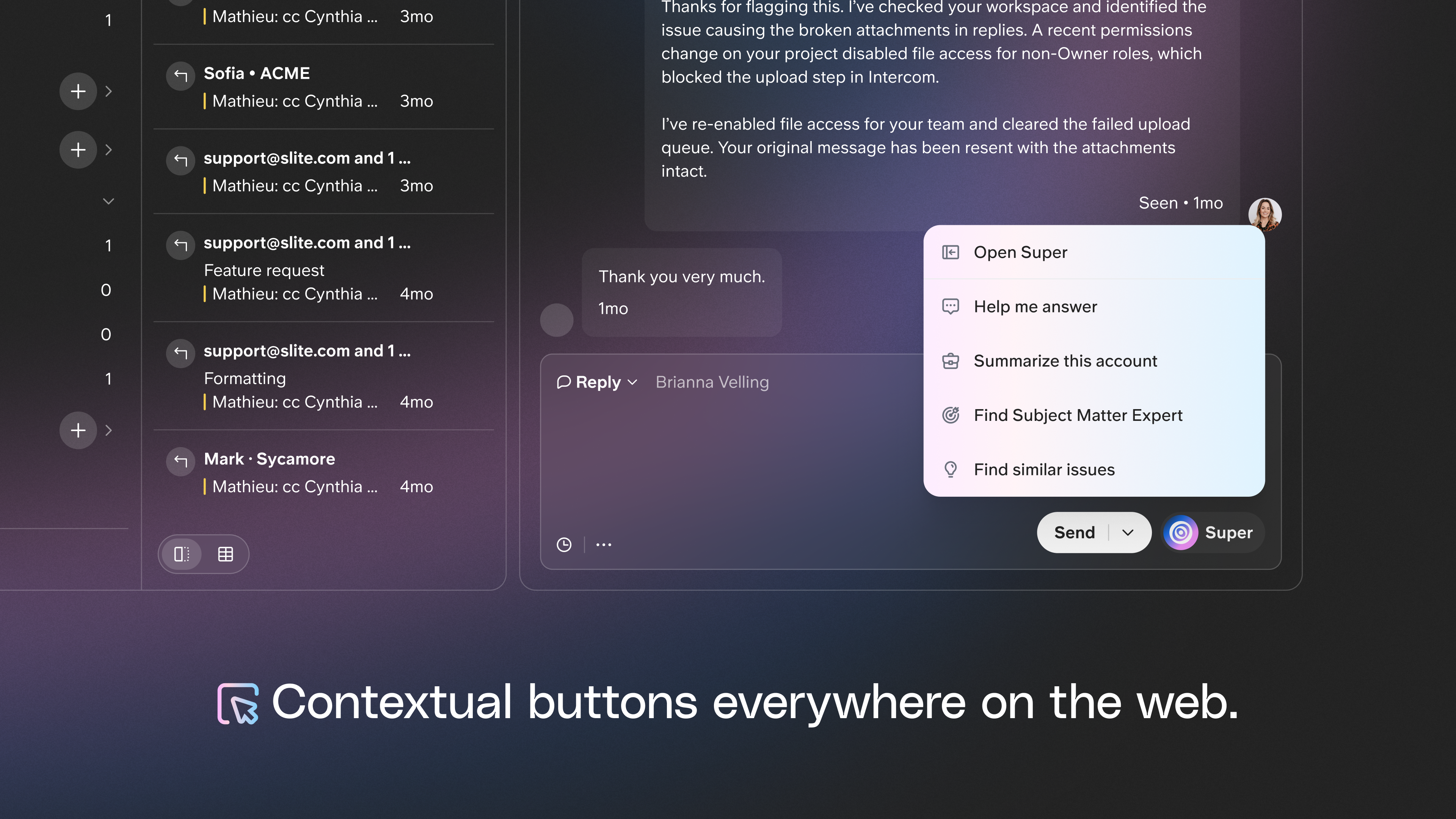
The button reads what's on the page (account details, conversation history), adds context from your connected sources, then executes predefined actions like summarizing conversations, surfacing notes, drafting replies for customer support teams, finding similar issues, or identifying subject matter experts.
Pricing
Super costs $20/month (billed monthly) or $15/month on annual billing.
Notion AI only comes in Notion's business plan which costs $24/month on monthly billing and $20/month on annual billing
Notion AI has a 4-week free trial and Super offers a 3 week free trial after talking to sales.
Summing up
Notion AI is cool for Notion users and does a good job at being the enterprise search layer within Notion's ecosystem.
For enterprise search and knowledge work, Super is better because it's a tool-agnostic knowledge layer for all your tools. You can even use Super as an API or webhook in n8n or Zapier to get updated knowledge cross-tool in any workflow.
With Notion AI, you're getting lightweight genAI capabilities within Notion's interface with enterprise search being one of them.
With Super, you're getting company memory that can be used for everyday questions like "where's that file" to complex workflows where knowledge retrieval is of the essence.
Notion AI's maximum ROI is achieved when you're already all-in on Notion's ecosystem.
Adding AI capabilities for $24/month per user makes sense because it's integrated into your existing workflow. But if you're just looking for enterprise search capabilities and already have your tools (Slack, Google Drive, Jira, etc.), you're paying $24/month for a full workspace platform when all you needed was search.
Super's maximum ROI is achieved out of the box as a dedicated enterprise search tool.
Companies know what to do with it. All the use cases (automated digests, bulk processing, contextual buttons) are useful for all departments, from IT teams managing policies and operations to customer-facing roles. It automates your knowledge work and creates a knowledge layer across your entire company's existing tools.
The choice is simple: If you're already living in Notion, Notion AI makes sense. If you're looking for an enterprise search tool that automates knowledge work across your existing suite of tools, Super delivers better accuracy and more features at a lower cost.

Ishaan Gupta
Ishaan Gupta is a writer at Slite. He doom scrolls for research and geeks out on all things creativity. Send him nice Substack articles to be on his good side.
Ready to supercharge your workflow?
Connect your tools and start getting instant answers.
We've been building solutions for knowledge sharing and better work since 2016.